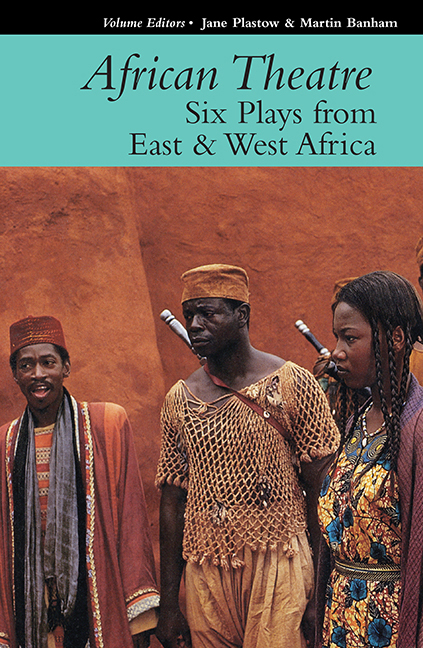Book contents
- Frontmatter
- Contents
- Notes on Contributors
- Obituary: Adieu Alain Ricard
- Preface
- THREE PLAYS FROM EAST AFRICA
- The translation & transcription of transcription of Mother Uganda & Her Children
- Mother Uganda & Her Children
- The context & making of Rose Mbowa's Mother Uganda & Her Children
- Majangwa: A Promise of Rains
- Notions of indigeneity: Uganda's Robert Serumaga
- The Guest (Engida): A One Act Play
- An Absurdist in Addis Ababa: Manyazewal Endeshaw's Engida
- THREE PLAYS FROM WEST AFRICA
- Book Reviews
Notions of indigeneity: Uganda's Robert Serumaga
from THREE PLAYS FROM EAST AFRICA
Published online by Cambridge University Press: 24 August 2019
- Frontmatter
- Contents
- Notes on Contributors
- Obituary: Adieu Alain Ricard
- Preface
- THREE PLAYS FROM EAST AFRICA
- The translation & transcription of transcription of Mother Uganda & Her Children
- Mother Uganda & Her Children
- The context & making of Rose Mbowa's Mother Uganda & Her Children
- Majangwa: A Promise of Rains
- Notions of indigeneity: Uganda's Robert Serumaga
- The Guest (Engida): A One Act Play
- An Absurdist in Addis Ababa: Manyazewal Endeshaw's Engida
- THREE PLAYS FROM WEST AFRICA
- Book Reviews
Summary
Ugandan Robert Serumaga, arguably the greatest theatrical director ever produced by Africa, died by poisoning in Kenya at the age of 41 in 1980. No one was ever found guilty of his murder. There are numerous contradictory stories about how he died, most involving reports of a visit to his room by a beautiful woman who supposedly administered a lethal dose of poison. However his death occurred, it brought to a violent end the life of one of Africa's theatrical giants, one nearly forgotten today by much of the theatre world. Serumaga was, early in his career, a dramatist of power and later a charismatic actor, a visionary artistic guru and finally a theatrical provocateur who combined notions of African indigeneity with a range of European dramatic forms ranging from the psychologically rooted theatre of Stanislavski to the dramatic tropes of the Theatre of the Absurd to the ritually tinged edges of Artaud's vision of Total Theatre.
Serumaga was also a fine economist – trained at Dublin's prestigious Trinity College (some may wish to note the absurdist Samuel Beckett's own Trinity connections here) – but one obsessed by politics in both his life and work. That Serumaga survived the reign of the dictator Idi Amin was something of a miracle. That his company, Abafumi (The Storytellers), did not is no surprise. Serumaga was simultaneously taking part in the anti-Amin underground while running Abafumi, a career combination that was as theatrically mad as it was politically dangerous. We know now that Serumaga was taking funds from the CIA at this time, funds which were used to support both his causes. When Amin was finally driven into exile, Serumaga, rather than turning to his company full-time, took on a cabinet position with the new government. Only months later came his fatal trip to Kenya. That he had political enemies was obvious. As was the fact that he loved beautiful women.
Where Serumaga's political career might have led had he lived is anyone's guess. But at his death he had certainly achieved international theatrical fame with his company for his 1970s masterpieces Renga Moi (a name that roughly translates in Uganda's Acholi language as Valiant Warrior) and Amayirikiti (in Luganda, The Flame Trees).
- Type
- Chapter
- Information
- African Theatre 16: Six Plays from East & West Africa , pp. 88 - 97Publisher: Boydell & BrewerPrint publication year: 2017



